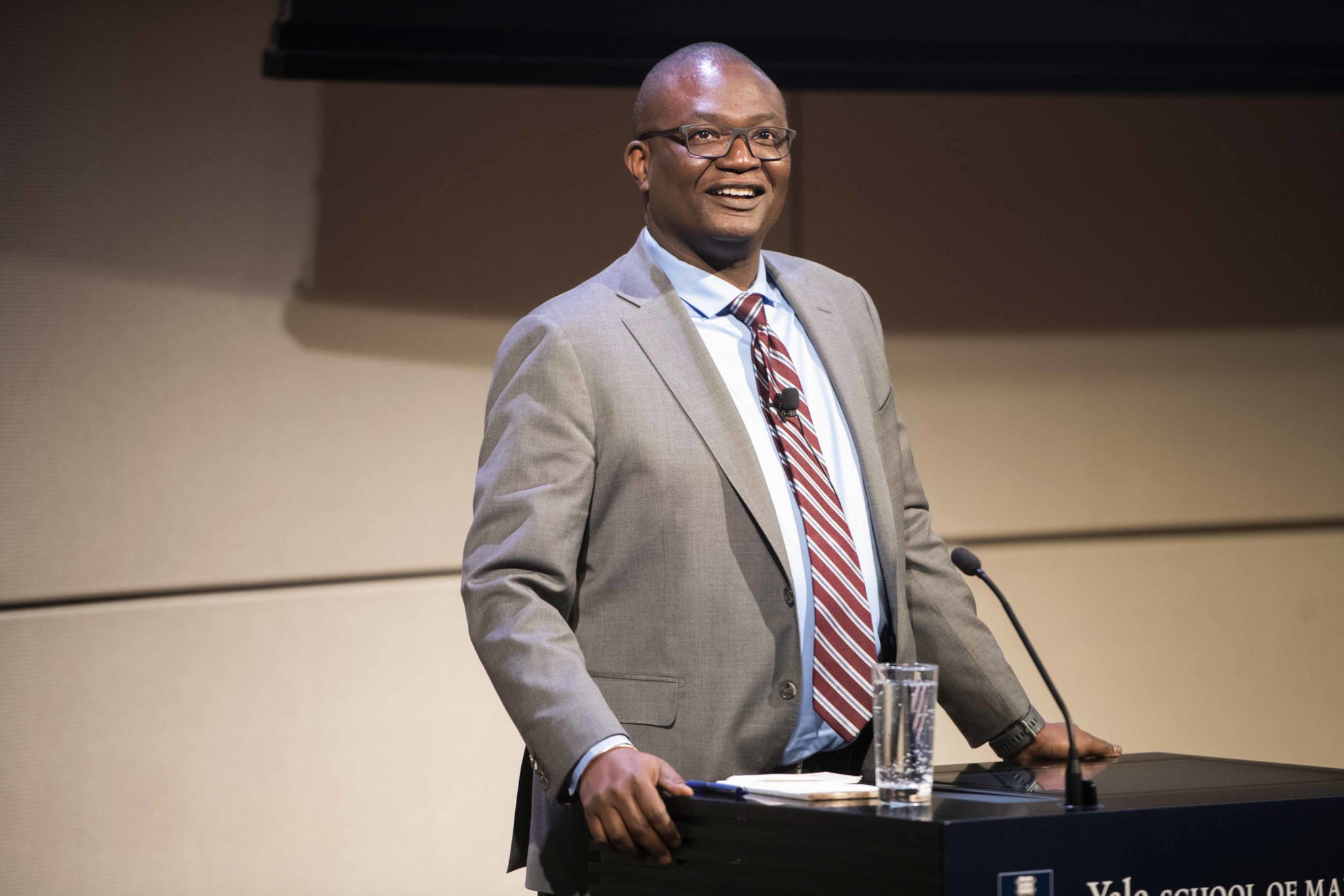
Courtesy of Yale School of Management
Last week, School of Management Dean Kerwin Charles announced measures that SOM will take to address systemic racism and achieve greater diversity in its student body and faculty.
Charles emailed his statement to the SOM community on Tuesday, outlining steps to make the school a place where everybody feels welcome and able to contribute. His statement comes amid the national Black Lives Matter movement and follows a summer letter from students and alumni demanding that SOM address systemic racism.
SOM Director of Community and Inclusion Kristen Beyers told the News that the plan is focused on three ways to respond to racism: attracting and retaining diverse talent to SOM, fostering an inclusive community and including topics of race, diversity, equity and inclusion in the SOM curriculum.
“We at SOM are called upon to address systemic racism, both because we are part of the larger national current and because our distinctive mission urges us to engage with pressing societal issues,” Charles wrote in his statement. “Inspired by a common purpose, we hope to implement changes and policies that are informed, durable, and consequential. I, for one, have no interest in making purely cosmetic changes, and I know [members of the SOM community] share this opinion.”
Over the summer, more than 600 current SOM students and alumni signed a letter addressed to Charles demanding that the school take action to address systemic racism and laying out multiple requests to make SOM a more equitable environment.
The letter was organized by SOM Alumni for Change, a group composed of recent alumni Meryl Breidbart SOM ’20, Allison Chlapaty SOM ’20, Amanda Hatheway SOM ’20, Miya Sharpe SOM ’20, Charlotte Suelau SOM ’20 and Elizabeth Tullis SOM ’20.
“SOM was founded in 1976 and, like most of Yale University, was built by the white majority for the white majority,” the group wrote in an email to the News. “It has become the most global business school, and boasts quite a lot of diversity, but in practice, that diversity is not visible in the curriculum, the faculty or the student body.”
According to SOM Alumni for Change, US-born Black students made up less than two percent of the SOM class of 2020 and there are merely four Black professors on faculty –– only two of whom are tenured. The group also pointed out that, of the 56 protagonists in the SOM core case curriculum, only three are people of color.
Ben Healey ’04 SOM ’12 told the News that he signed the petition to challenge the school to live up to its highest ideals and to focus on building leaders who recognize inequities within society.
“I don’t point my finger at SOM and say, ‘Boy, you’re so terrible,’” Healey said. “I instead say this is a pretty special place that has the opportunity to be even more great. Part of that is having a real focus on who gets to be part of that community, and how you strengthen the position of those who have been excluded in a fundamentally respectful and engaged manner.”
He added that he feels Charles’ statement was respectful and engaged, and that he is hopeful about the changes that will be taking place in SOM.
Similarly, SOM Alumni for Change met with Charles in August to discuss efforts to address systemic racism, and they said that his recent statement “rang true to his word” from the meeting. They added that Charles is the “right person” to bring SOM into a more diverse and inclusive future.
“This work is crucial not only because it’s the right thing to do, it’s also what we are called to do based on SOM’s mission,” Beyers wrote in an email to the News. “We promise our students, employers and other stakeholders that we will educate leaders for business and society. We cannot fulfill this mission without including topics around diversity, equity and inclusion in and out of the classroom.”
Specifically, Charles’ statement outlined numerous short-term measures that the school will take to address systemic racism.
For one, he will create a Dean’s Advisory Council on Antiracism, Diversity and Climate –– composed of SOM students, alumni, faculty and staff –– to collect criticisms and concerns and to propose suggestions. Additionally, the school will provide more resources to its Community and Inclusion team and diversify the iconography in the SOM building to include more portraits of people of color.
In the spring, Charles will teach a course dedicated to the problem of “systemic racism in the broader cultural, historical and social milieu.” This course, which will be open to all SOM students, is intended to underscore the importance of race and inclusion for business schools today, Charles said in his statement. SOM Alumni for Change said that Charles’ class is a “commendable first step” that provides a curriculum which is not often found in business schools.
“From my experience, diversity aspirations do not succeed without leadership accountability and continued measurement,” Beyers said. “Addressing racism and inclusion for all marginalized groups is a massive undertaking and requires collective action. Our most important step in this process is the creation of a specific plan with short- and long-term commitments, which enlists many stakeholders in driving this important work.”
Some of the long-term commitments introduced in Charles’ statement include an effort to increase Black representation in SOM’s student body to a nationally representative level by creating new scholarship funds and strengthening connections to historically Black colleges and universities. According to Charles, SOM will also build more helpful connections with the New Haven community and create more spaces for discourse about racism through various lecture series.
Another long-term goal is to increase the number of Black ladder faculty at SOM. Earlier this summer, SOM created a faculty mentoring program to support Black academics early in their careers to help facilitate this goal, according to Charles.
“This is a longstanding SOM and Yale University objective,” Charles said in his statement. “I have expressed to every faculty member that hiring [which] diversifies the racial makeup of our faculty is a priority of mine.”
Despite the positive sentiments made by SOM Alumni for Change regarding the statement, the group still holds some doubt regarding the future of the changes. The group told the News that many of the commitments Charles made in his statement lack details on their implementation, as well as methods to measure their success and plans for holding the school’s administration accountable.
Specifically, the group highlighted uncertainty over how the additional funding for the Community and Inclusion team will be used. They also voiced concerns about the lack of a timeline for increasing Black student enrollment and Black ladder faculty.
“The letter shows how passionate the administration is and does a lot to earn the trust of their students and alumni,” the group wrote in an email to the News. “The next and equally important step is creating a plan to ensure that they are implemented, measured and expanded upon to keep our trust and ensure that SOM is a school for all students, regardless of race.”
Charles has been the dean of SOM since July 2019.
Julia Brown | julia.k.brown@yale.edu








